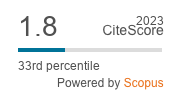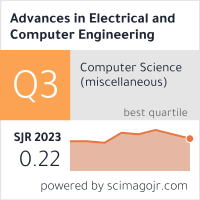| 4/2023 - 6 |
The Constellation Modification in Frequency Multiplication on MPSK Data TransmissionERSOY, O. |
| Extra paper information in |
| Click to see author's profile in |
| Download PDF |
Author keywords
constellation modification, frequency multiplication, millimeter wave communication, phase shift keying, 5G mobile communication
References keywords
communications(17), terahertz(12), phase(11), performance(8), systems(7), indoor(7), noise(6), electronics(6), communication(6), access(6)
No common words between the references section and the paper title.
About this article
Date of Publication: 2023-11-30
Volume 23, Issue 4, Year 2023, On page(s): 51 - 60
ISSN: 1582-7445, e-ISSN: 1844-7600
Digital Object Identifier: 10.4316/AECE.2023.04006
Web of Science Accession Number: 001147490000007
SCOPUS ID: 85182227910
Abstract
This research aims to introduce an innovative method of constellation modification in MPSK data transmission through utilization of frequency multiplication. This method presents a significant solution for providing efficient data transmission in millimeter wave frequency band, addressing the requisites for high data rates and capacity. However, the application of frequency multiplication to MPSK signal causes problems wherein data recovery becomes unattainable due to nonlinearity. Hence, a modified MPSK modulator is developed. Along with the standard MPSK modulator, back-to-back and line-of-sight (LOS) measurements of the modified MPSK modulator are performed. To conduct the standard and modified MPSK modulators in real-time, the development of transmitter and receiver blocks is undertaken using LabVIEW and experimentation is performed employing the SDRs. Comparative analysis reveals that the modified MPSK modulator, conceived through the proposed method, yields improvement in error performance while mitigating the computational burden from digital processing. Importantly, these enhancements are achieved without necessitating alterations in receiver. BER results for measurements of standard and modified MPSK are obtained. The findings substantiate the effectiveness of the proposed method, manifesting a discernible enhancement in error performance. This method proves appropriate for MPSK data in experimental millimeter wave band investigations utilizing frequency multiplier chains. |
| References | | | Cited By |
Web of Science® Times Cited: 0
View record in Web of Science® [View]
View Related Records® [View]
Updated 6 days, 3 hours ago
SCOPUS® Times Cited: 0
View record in SCOPUS® [Free preview]
There are no citing papers in the CrossRef Cited-by Linking system.
Disclaimer: All information displayed above was retrieved by using remote connections to respective databases. For the best user experience, we update all data by using background processes, and use caches in order to reduce the load on the servers we retrieve the information from. As we have no control on the availability of the database servers and sometimes the Internet connectivity may be affected, we do not guarantee the information is correct or complete. For the most accurate data, please always consult the database sites directly. Some external links require authentication or an institutional subscription.
Web of Science® is a registered trademark of Clarivate Analytics, Scopus® is a registered trademark of Elsevier B.V., other product names, company names, brand names, trademarks and logos are the property of their respective owners.
Faculty of Electrical Engineering and Computer Science
Stefan cel Mare University of Suceava, Romania
All rights reserved: Advances in Electrical and Computer Engineering is a registered trademark of the Stefan cel Mare University of Suceava. No part of this publication may be reproduced, stored in a retrieval system, photocopied, recorded or archived, without the written permission from the Editor. When authors submit their papers for publication, they agree that the copyright for their article be transferred to the Faculty of Electrical Engineering and Computer Science, Stefan cel Mare University of Suceava, Romania, if and only if the articles are accepted for publication. The copyright covers the exclusive rights to reproduce and distribute the article, including reprints and translations.
Permission for other use: The copyright owner's consent does not extend to copying for general distribution, for promotion, for creating new works, or for resale. Specific written permission must be obtained from the Editor for such copying. Direct linking to files hosted on this website is strictly prohibited.
Disclaimer: Whilst every effort is made by the publishers and editorial board to see that no inaccurate or misleading data, opinions or statements appear in this journal, they wish to make it clear that all information and opinions formulated in the articles, as well as linguistic accuracy, are the sole responsibility of the author.



